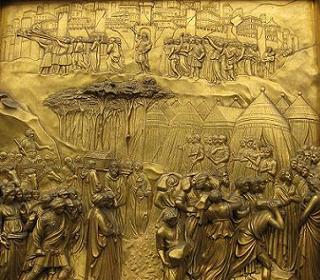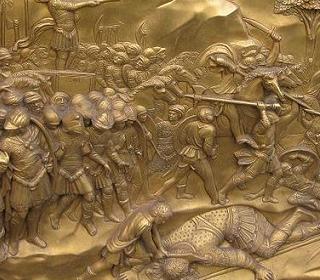
LIFE AS MYTH
![]()
JOURNAL
![]()
JOURNAL 2010
![]()
A vision quest
Finding a guiding light
![]()
AUTUMN 2010
Visions of paradise
![]()
LIFEWORKS
![]()
ATLAS
![]()

AUTUMN 2010
THE GATES OF PARADISE
The battle of Jericho. Gilded bronze panel. Battistero di San Giovanni. Florence, Italy. c. 1450. Photo: Deror Avi.
The slaying of Goliath. Gilded bronze panel. Battistero di San Giovanni. Florence, Italy. c. 1450. Photo: Deror Avi.
The oldest surviving autobiography of an artist is Ghiberti's Commentarii. Ghiberti was an avid historian and though this manuscript is incomplete it still provides valuable information on the Italian artists of the 14th Century. The period, known as the Trecento [mille trecentro, Italian for 1300], marks the beginning of the Italian Renaissance movement. In addition to fostering significant advancement in music, painting and sculpture, this era nurtured writers in their transition from Latin to the more accessible vernacular. Notables from this period include Dante, Petrarch and Boccaccio.
The gilded bronze doors on the eastern portal of the Battistero di San Giovanni [Florence] are the masterwork creation of Lorenzo Ghiberti [1378 - 1455]. Named "The gates of paradise" by Michelangelo, they are seventeen feet high and feature ten panels of Old Testament scenes. These magnificent doors mark the arrival of the Italian Renaissance.
Ghiberti first gained public recognition in 1401 when he won a commission to produce a set of bronze doors for the Florence baptistery. These doors were originally imagined as containing twenty-eight scenes from the Old Testament. However, the focus of the design changed during production to motifs which featured instead New Testament stories and the lives of the saints. Work on this commission began in 1403 and concluded in 1424. Upon completion of this project, Ghiberti immediately received a commission for the bronze doors which would become known as "The gates of paradise". Work on these ten-paneled doors took twenty-seven years to complete [1425 - 1452].


